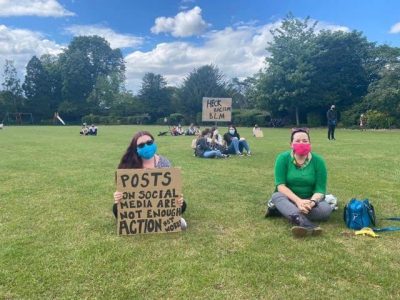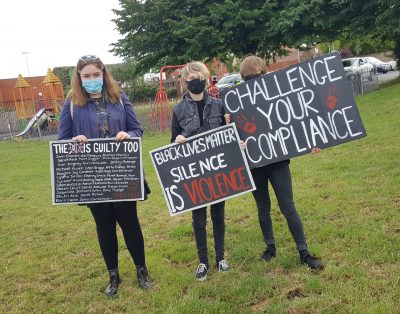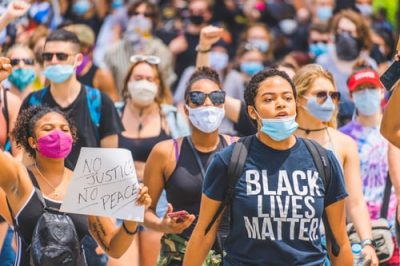
Wells CLP send our solidarity and share in the grief of the family, friends and community of George Floyd in Minneapolis. We condemn the institutional and systemic racism that caused his death and continues to kill black people in the US and here in the UK. We stand for #JusticeForGeorgeFloyd. We say #BlackLivesMatter.
George Floyd’s death, and the deaths of hundreds of other members of the black community in
America, take place in a context of centuries of social deprivation and economic oppression that
have also been endured by other black communities across the globe. This utterly brutal and racist
act was the touch paper to ignite a revolt already simmering beneath the deepest processes of a
system built upon inequality and racism.
Sadly, such acts of racial hatred are by no means new or unique to America. Here in the UK, we
must confront the reality that black people disproportionately suffer from use of force by police;
are over-represented in prison populations; are 28 times more likely to be stopped and searched
by police and are more likely to be sent to prison than white offenders. According to INQUEST,
there have been 1741 deaths following contact with the police in England & Wales since 1990 –
with black communities disproportionately impacted. The Runnymede Trust found that from 1995
to 2015, not a single police officer was prosecuted in the UK over a black person’s death in
custody. Furthermore, in Somerset, a person of colour is 42 times more likely to be subjected to
stop and search than a white person.
Brutal Murder

The brutal murder of George Floyd would by itself entirely justify the pain and anger that
communities feel, but so too should any of the other hundreds of black people killed by American
police. This has been thrown into even sharper focus by America’s handling of the Covid-19
pandemic, where black Americans are dying at three times the rate of white Americans. Black
communities, disproportionately represented on the front line, are forced to work for low wages,
often with no protection. In addition, economic poverty, unemployment and multiple occupation
of inadequate housing has left black communities highly vulnerable to Covid 19. The extra-judicial
killings by the police, must be viewed within the context of an unjust system, which is also
simultaneously forcing black people into poverty due to mass unemployment.
The global health pandemic has reminded people in the UK of the critical role black workers play in
our NHS and our care homes, our transport systems and food supply, and in education and every
other profession and sector of our country; yet we also face a situation where black workers are
disproportionately impacted by the expression of institutional and structural racism through state
violence and the Coronavirus pandemic. Health inequalities mean that the COVID-19 crisis is not
the first instance of health disparities in our country – for example, black women are five times
more likely to die in child birth and there is twice the rate of infant mortality in Pakistani, black
Caribbean and black African families, along with a lower life expectancy.
Stand Together

While senior Conservatives have acted with impunity, black people have been disproportionately
apprehended, stopped and searched during the lockdown period. For example, Desmond Ziggy
Mombeyarara was tasered in front of his child at Manchester petrol station and Dwayne Francis
was handcuffed and detained by the police when he was waiting in his car for the post office to
open. Recently, a 13 year old boy, Hugo Boateng, was injured when he and his father, Andrew,
were apprehended by police whilst on a charity bike ride in North London. Ironically, Andrew is a
volunteer for an outreach programme between local youth and the Police.
We must stand together as one to fight institutional racism, structural racism and social injustice,
and work together to promote a society based on fairness and justice. We cannot be bystanders.
We must organise collectively to fight racism and demand that governments urgently address the
racial disparities in society. Words are not enough, neither is it enough for us to be just “not
racist”; we must now be actively anti-racist and be prepared to stand up to racism wherever it
rears its head, to educate those who are simply ignorant and to call out those who are overtly and
unashamedly racist. We recognise that no lives matter until black lives matter.
We therefore wish to build on the impetus and initiative of Black Lives Matter by:
Educating ourselves about African History and the history of racism in Britain, including
about the legacy of slavery, making visible the hidden history in our heritage and buildings
in order to honour those whose unpaid, torturous labours created the initial wealth on
which they were founded. We support calls for reparations to be made to the descendants
of enslaved Africans.
Understanding the dangers of the rise of far right ‘white supremacy’, as well as the
insidiousness of ‘white privilege’ and toxic ‘whiteness’ that affects all of us who are white.
Demanding full accountability of the criminal justice system, particularly at the interface of
police with the black community, in order to end brutality.
Demanding that the government acts to redress the social and economic inequalities
across all areas of society that are based on race.
Demanding that BAME citizens are appointed to public bodies as a matter of course and
that BAME citizens are supported to take their equal place in democratic society.
Calling out and opposing structural and direct racism wherever it occurs and in particular
amongst opinion-formers or mainstream media influencers.
https://interactive.aljazeera.com/aje/2020/know-their-names/index.html
